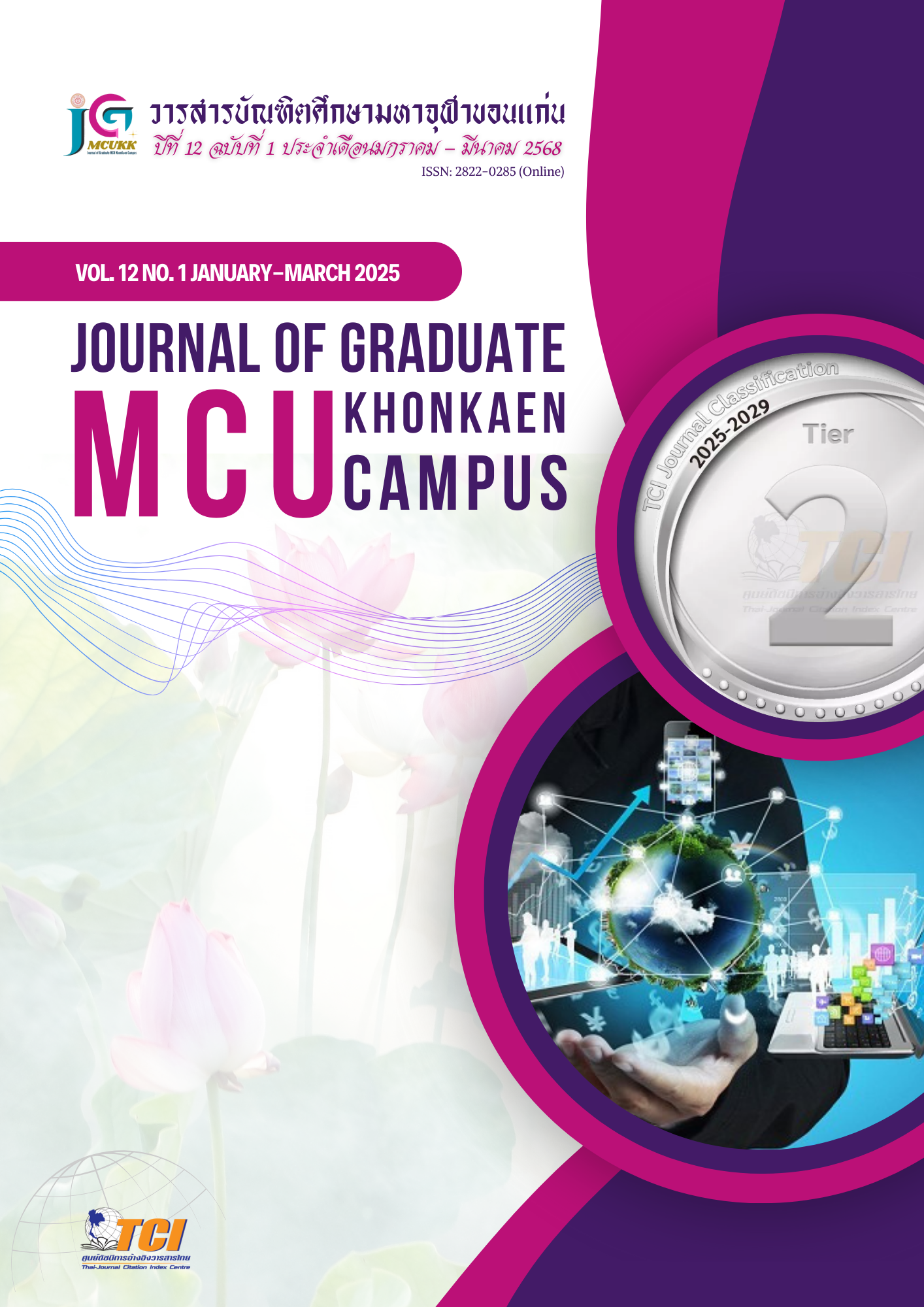หลักพุทธจิตวิทยาเพื่อการพัฒนาจิตใจให้เข้าถึงความสุข
Main Article Content
บทคัดย่อ
บทความวิชาการนี้มีวัตถุประสงค์ โดยการนำหลักพุทธจิตวิทยาเพื่อพัฒนาจิตใจให้เข้าถึงความสุขมุ่งเน้นการเรียนรู้นำหลักธรรมทางพระพุทธศาสนาในทางสายกลางมัชฌิมาปฏิปทา เป็นวิธีปฏิบัติที่นำมาใช้ได้กับทุกเรื่องทุกอย่างในชีวิตอย่างพอเพียง มรรคมีองค์ 8 หรือ อริยมรรค มีองค์แปดประการ บทความนี้ประกอบด้วยหลักธรรมไตรสิกขา 3 ประการ คือ ศีลภาวนา สีลสิกขา พัฒนากาย และ สมาธิภาวนา
อธิจิตสิกขา คือ พัฒนาคุณภาพจิต พัฒนาสมรรถภาพจิต พัฒนาสุขภาพจิต และปัญญาภาวนา อธิสิกขา พัฒนาปัญญาโดยการปฏิบัติตามหลักสติปัฏฐาน 4 หรือทางดำเนินชีวิตในการฝึกให้เกิดสติ ก็คือ การทำสติปัฏฐาน มีสติระลึกรู้กาย เรียกกายในกาย เวทนาในเวทนา จิตในจิต ธรรมในธรรม หลักธรรมที่กล่าวมานี้ถือว่า หลักพุทธจิตวิทยาอันนำไปประยุกต์ใช้กับชีวิตได้เป็นอย่างดี ชาวพุทธหรือคนทั่วไปต้องการจะพัฒนาตนให้เข้าถึงความสุขนั้น คือ การนำหลักธรรมอันประเสริฐสู่การปฏิบัติให้ถึงพร้อมทั้งกายและจิตควบคู่กันไปอย่างสม่ำเสมอให้เป็นกิจวัตรต่อเนื่อง ชีวิตก็จะมีแต่ความสุข สงบ สว่าง ปีติ สุข ซึ่งพระพุทธศาสนาเรียกว่า กุศล (Kusala or Merit) คือ ความดีและความสุข ดังได้เรียบเรียงมาแล้ว
Article Details

อนุญาตภายใต้เงื่อนไข Creative Commons Attribution-NonCommercial-NoDerivatives 4.0 International License.
เอกสารอ้างอิง
กรมการศาสนา กระทรวงศึกษาธิการ. (2539). คู่มือการศึกษาธรรมชั้นตรี. โรงพิมพ์การศาสนา.
จิราภา เต็งไตรรัตน์ และคณะ. (2552) จิตวิทยาทั่วไป. โรงพิมพ์มหาวิทยาลัยธรรมศาสตร์.
จำนง อดิวัฒนสิทธิ์. (2545). สังคมวิทยาตามแนวพุทธศาสตร์. สำนักงานอธิการบดี: มหาวิทยาลัยมหาจุฬาลงกรณราชวิทยาลัย.
ณิรดา เวชญาลักษณ์. (2561) หลักการจัดการเรียนรู้. โรงพิมพ์แห่งจุฬาลงกรณ์มหาวิทยาลัย.
ทัศนีย์ ทองสว่าง. (2537). สังคมไทย ภาควิชาสังคมวิทยา คณะสังคมศาสตร์ มหาวิทยาลัยศรีนครินทรวิโรฒประสานมิตร.
พระเทพเวที (ป.อ.ปยุตโต). (2531) พัฒนาตน. (พิมพ์ครั้งที่ 2). มูลนิธิโกมลคีมทอง.
มหาจุฬาลงกรณราชวิทยาลัย. (2539. พระไตรปิฎกภาษาไทย ฉบับมหาจุฬาลงกรณราชวิทยาลัย. โรงพิมพ์มหาจุฬาลงกรณราชวิทยาลัย. เล่ม : 11
พระธรรมปิฎก (ป.อ.ปยุตฺโต). (2540) พุทธธรรมกับการพัฒนาชีวิต. โรงพิมพ์ธรรมสภา.
______. (2549) สุขภาวะองค์รวมแนวพุทธ. นครปฐม : วัดญาณเวศกวัน.
______. 2546. พระไตรปิฎกสิ่งที่ชาวพุทธต้องรู้. สำนักพิมพ์ แมสโปรดักส์.
พระพรหมคุณาภรณ์ (ป.อ.ปยุตฺโต). (2538). พุทธธรรม. โรงพิมพ์มหาจุฬาลงกรณราชวิทยาลัย.
______. (2538). พจนานุกรมพุทธศาสตร์ ฉบับประมวลธรรม.บริษัท สื่อตะวัน จำกัด.
______. (2545). พจนานุกรมพุทธศาสตร์. ธรรมสภา.
______. (2554) พจนานุกรมพุทธศาสตร์. ธรรมสภา.
พระครูสิริรัตนานุวัตร. (2555). ศาสตร์ร่วมสังคม. โปกัสปริ้นต์.
วิทยากร เชียงกูล. (2552). จิตวิทยาและการพัฒนาตนเอง. เดือนตุลา.
พิสิฐ เจริญสุข. (2542). คู่มือการอบรมสมาธิ. กรมการศาสนา.
คณาจารย์สำนักพิมพ์เลี่ยงเชียง. (2547). พุทธประวัติฉบับมาตรฐาน. โรงพิมพ์เลี่ยงเชียง.
สมเด็จพระปรมานุชิตชิโนรส. พระปรมสมโพธิกถา (พิศดาร 27 ปริเฉท). โรงพิมพ์เลี่ยงเชียง ม.ป.ป.
กรมการศาสนา กระทรวงศึกษาธิการ. (2539). คู่มือการศึกษาธรรมชั้นตรี. โรงพิมพ์การศาสนา.

